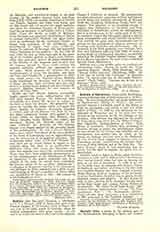

Baldwin of Canterbury, thirty-ninth Archbishop, a native of Exeter, date of birth unknown; d. November 19, 1190. He was ordained priest and made archdeacon by Bartholomew, Bishop of Exeter. He subsequently became a Cistercian monk at the Abbey of Ford, in Devonshire, and within a year was made Abbot of Ford. In 1180 he was promoted to the Bishopric of Worcester and in the same year was elected to the primatial see by the bishops of the province. The election was disputed by the monks of Canterbury, who chose first the Abbot of Battle, then Theobald, Cardinal–Bishop of Ostia. King Henry II interfered. Baldwin, who, according to Gervase, refused to accept the archbishopric unless he was elected by the monks, was installed, and an arrangement was entered into by which, in the future, the bishops’ elections were to be disallowed. He was several times engaged in disputes with the Canterbury monks, necessitating the further interference of King Richard and of the Holy See. The prior, Norreys, whom he had nominated, was deposed; but his right to appoint the priors was acknowledged.
Baldwin acted as legate in Wales, where he held a visitation in 1187, and in 1188 preached the Crusade, after having himself taken the cross on hearing the news of the loss of Jerusalem. In 1190 he set out for the Holy Land, in company with Hubert, Bishop of Salisbury, and others, providing at his own costs two hundred knights and three hundred retainers. While there he acted as vicegerent of the patriarch. Giraldus Cambrensis describes him as gentle, kindly disposed, learned, and religious. He died during the siege of Acre, leaving all he possessed for the relief of the Holy Land and naming Bishop Hubert as his executor. His works (to be found in the “Bibliotheca Patrum Cisterciensium”, V) are “De Coinmendatione Fidei”; “De Sacramento Altaris”. There are also some discourses and a penitential in MS. preserved in the Lambeth Library.
FRANCIS AVELING

